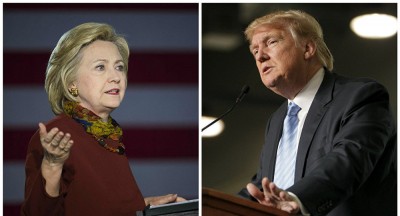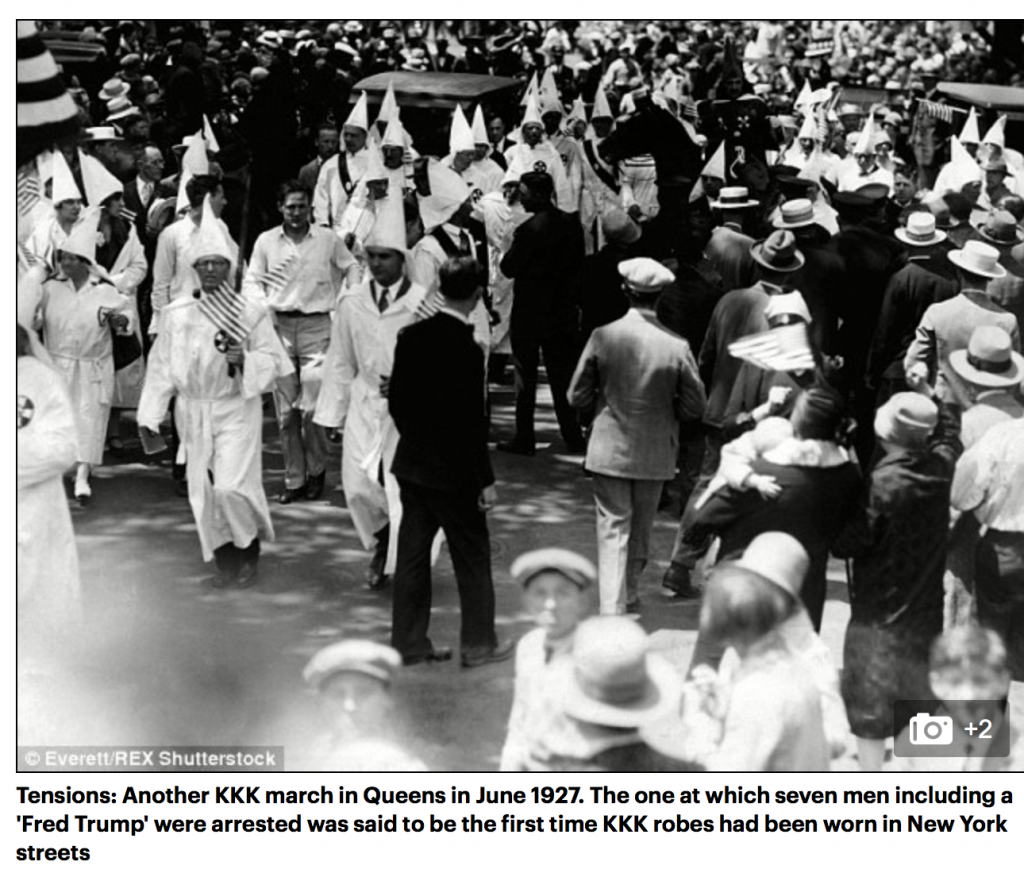Elections 2016: Trump, Clinton and Racism in American Politics

Press reports on the latest charges by both the Republican and Democratic Party candidates that their opponents have ties with the Ku Klux Klan are not surprising.
Racist political culture is part and parcel of the history of the United States where the nation-state was founded through the forced removal and genocide of the indigenous Native peoples and the enslavement of Africans.
Neither of the two ruling class parties have ever expressed regret or apologized for the mass slaughter of Native Americans or the centuries-long capture and super-exploitation of African people. Today the indigenous people remain largely absent from the public view in the U.S. while Africans are still stigmatized by the legacy of enslavement and the century of legalized segregation after the destruction of Reconstruction policies in the post-Civil War era.
In the most recent period Republican presidential candidate Donald Trump has sought to deflect attention away from his personal family connections with the Ku Klux Klan as well as his response to pledges of support from modern-day ideological racists such as former Grand Wizard David Duke. A report from a New York newspaper in 1927 has resurfaced reporting that Trump’s father was arrested amid a brawl at a Ku Klux Klan rally in Queens. (Washington Post, Feb. 29)
These allegations carry weight in light of the rhetoric of Trump which targets so-called “illegal immigrants”, as code words for people from Mexico and other Central American states, along with the claims that Muslims from nations in the Middle East, Africa and Asia are somehow more prone to commit acts of terrorism.
This writer in an article published several months ago during the primary process said: “Donald Trump’s hesitancy and denial of knowing much about the Ku Klux Klan in response to an endorsement by former Neo-Nazi and Grand Wizard David Duke speaks volumes about the political character of the Republican Party and its electoral base. Trump appeared on Cable News Network’s State of the Union program when he was asked about support coming from Duke.” (Racism and Electoral Politics, Global Research, March 8)
The report continues quoting the Republican candidate who stressed: “I have to look at the group. I mean, I don’t know what group you’re talking about,’ Trump said nonchalantly. He then went on to say: ‘You wouldn’t want me to condemn a group that I know nothing about. I’d have to look. If you would send me a list of the groups, I will do research on them and certainly I would disavow if I thought there was something wrong. You may have groups in there that are totally fine — it would be very unfair. So give me a list of the groups and I’ll let you know.’” (CNN, Feb. 29)
Later the host Jake Tapper quickly responded saying: “OK. I’m just talking about David Duke and the Ku Klux Klan here, but –” then Trump said: “Honestly, I don’t know David Duke. I don’t believe I’ve ever met him. I’m pretty sure I didn’t meet him. And I just don’t know anything about him.”
Trump Makes Counter Charges Against Clinton
Not to be outdone by the claims of racism, Trump has now fired back saying that Hillary Clinton was mentored by a Klansman. This emanates from remarks made by Clinton at the time of the death of West Virginia Democratic Sen. Robert Byrd who had been a Grand Wizard of the Ku Klux Klan in his earlier years.
Byrd played a role in the political isolation of Dr. Martin Luther King, Jr. prior to his assassination when he took to the Senate floor in March 1968 decrying an outbreak of violence during a demonstration in Memphis, Tennessee in support of striking African American sanitation workers. Byrd demanded that King be stopped and that the Poor People’s Campaign that was being planned at the time to establish a camp in Washington, D.C. demanding an end to poverty was a threat to national security.
These charges against Clinton came in the form of a tweet from Diamond and Silk—sisters Lynette Hardaway and Rochelle Richardson, who are African Americans and open supporters Trump, having spoken at his rallies. The message referenced a statement by Clinton made about the former West Virginia Sen. Byrd, when Clinton called Byrd “a true American original, my friend and mentor.”
Trump has also reminded the public of Clinton’s labeling of “super-predators”, presumably alluding to young African Americans who have committed heinous crimes in urban areas. She was utilizing such terminology during the 1990s as a rationale for the signing of the ominous crime bill and other legislation which disproportionately impacted people in Black communities across the U.S. Bill Clinton recently in Philadelphia defended his support of such legislation responding to critics saying that they were defending murders and drug dealers.
Crime, Race and Punishment in U.S. Politics
The exponential growth in incarceration rates among African Americans is a decades-long process going back at least until the early 1980s under the administration of Ronald Reagan through his “war on drugs.” There appears to be no let-up in this trend since neither Trump or Clinton have pledged to work towards legislation that would not only release the unjustly convicted and sentenced–but to makeover the affected communities.
This prison-industrial-complex in many ways is another form of modern-day slavery. Under the federal legislation signed by the Clinton administration, many of those convicted of crimes face formidable challenges in securing work and housing.
Two examples of Klansmen and Klan sympathizers in U.S. politics occurred during the first two decades of the 20th century. Woodrow Wilson, the 28th president of the U.S., has been described as a “progressive Democrat” who authorized policies that benefited people inside the country and abroad, yet his legacy is one of racism and war, when he re-imposed draconian segregation that negatively impacted African Americans working and seeking employment in the civil service.
According to a column from the Boston University Professor’s Voice in 2013, it notes that:
“Cabinet heads — such as his son-in-law, Secretary of the Treasury William McAdoo of Tennessee – re-segregated facilities such as restrooms and cafeterias in their buildings. In some federal offices, screens were set up to separate white and black workers. African-Americans found it difficult to secure high-level civil service positions, which some had held under previous Republican administrations.”(William Keylor, March 4, 2013)
This column goes on to recall:
“A delegation of black professionals led by Monroe Trotter, a Phi Beta Kappa graduate of Harvard and Boston newspaper editor, appeared at the White House to protest the new policies. But Wilson treated them rudely and declared that ‘segregation is not a humiliation but a benefit, and ought to be so regarded by you gentlemen.’”
Wilson is also said to have made favorable comments about his friend, supporter and former classmate Thomas Dixon’s 1905 novel, “The Clansman,” which was adapted to film in the notoriously racist “The Birth of a Nation” in 1915 by D.W. Griffith. The film released during Wilson’s tenure in the White House is said to have prompted a resurgence of the Ku Klux Klan during World War I.
In Detroit during the 1920s, Charles Bowles ran for mayor on several occasions with open Klan support. He was eventually elected in 1929 but was recalled six months later.
This was not an anomaly for the period. The Washington Post pointed out in an article published on February 29 said:
“In 1923 and 1924, candidates from both parties who were explicitly endorsed by the Ku Klux Klan ran for governor in Texas, Arkansas, Maine, Arizona and Michigan. Candidates for governor in Kansas and mayor in Minneapolis and Houston were also rumored to have the Klan’s backing, though, at least in some cases, the men denied the claim. A candidate for city commissioner in Houston won election with the Klan’s backing; three opposed by the Klan won, too.”


